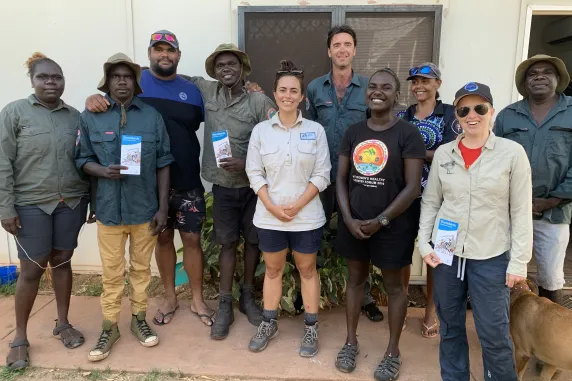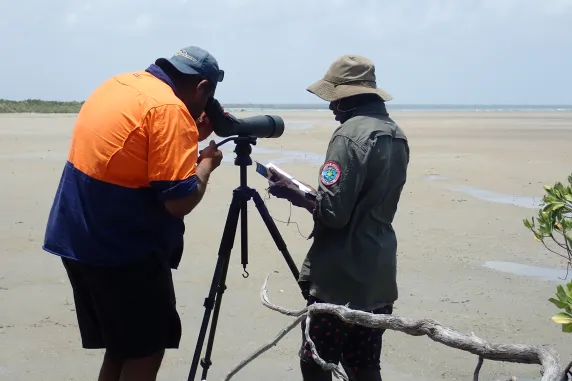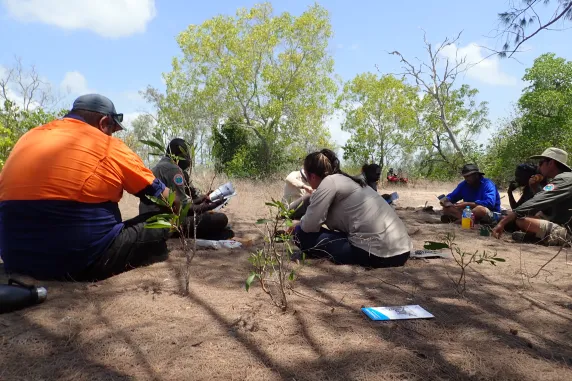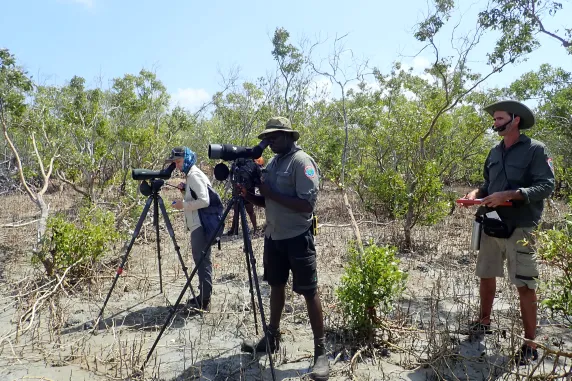Looking for Gudidi in Milingimbi
Gudidi – generic term for all small wading birds – Djambarrpuyŋu language from northeast Arnhem Land.
Looking out the window of the plane I was amazed to see the extent of what looked like saltpan habitat as our plane descended into the small remote community of Millingimbi or Yurruwi in northeast Arnhem Land of the Northern Territory.
Our team, made up of two Larrakia Rangers (Aleana Talbot, Alan Mummery), Micha Jackson (representing BirdLife Top End) and myself (representing RIEL CDU / NESP and BirdLife Top End) had been invited to join the Crocodile Islands Rangers from the Milingimbi Outstations Progress Resource Aboriginal Corporation for some shorebird surveys.
The Crocodile Island Rangers had done some shorebird surveys previously and had training from BirdLife Australia but wanted a refresher in identification and survey techniques. So, we set out on the boat on day one and got our bearings of the sites and what shorebird species were present. We quickly learned what a special place Milingimbi was, with an array of islands scattered across the shallow sea, some providing expanses of intertidal mudflat suitable for thousands of shorebirds. Walking across one of the islands, Budjeriki, we noticed collections of shells on the land and recognised them as shell middens, places where people would meet and eat shellfish, the remains collecting over time providing a geographic marker for generations to come. The Larrakia Rangers spoke about the shell midden monitoring work being done in Darwin Harbour and how these culturally important sites overlap with the habitat use of migratory shorebirds.
After returning to the ranger office, we delivered some presentations that would help with understanding shorebird ecology, the importance of monitoring and how the local work of the rangers in the Milingimbi region would connect with our understanding of shorebird population trends at a global level.
The next day we set out on the boats and arrived at a small island, Nilpaywa, where we were greeted by thousands of shorebirds scattered across the sandy intertidal zone. This provided us with an opportunity to identify shorebirds feeding close by, to watch birds coming into roost as the tide pushed up, and to practice our counting skills. We covered a large area and counted many birds, including some internationally significant numbers of some species, placing further importance on the area. These surveys gave the rangers practice in recording survey information, and later entering data into the Birdata database. The Crocodile Island Rangers plan on continuing their shorebird monitoring and like the Larrakia Rangers, these surveys provide an opportunity to spend more time on sea country, monitoring and patrolling the coastal area as well as additional time spent on the boat allowing rangers to obtain hours to contribute to coxswains training certification.
We thank the Crocodile Island Rangers team for welcoming us to their country, for sharing their birds, stories and language with us.
Dr Amanda Lilleyman is a Research Associate with RIEL
Related Articles

CDU strengthens China partnerships to drive sustainable agriculture and aquaculture research
Chinese delegates visited Darwin in August as part of a Charles Darwin University project between Australia and China on tropical aquaculture and cropping.
Read more about CDU strengthens China partnerships to drive sustainable agriculture and aquaculture research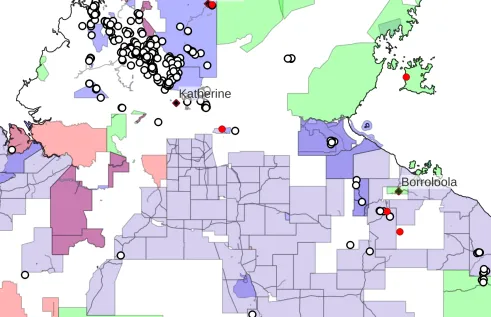
Consideration of First Nations cultural values in mining rehabilitation in the NT
Master by Research student Will Kemp investigated the consideration of First Nations cultural values in mine site rehabilitation planning, finding that the regulation of mining approval needs to achieve clearer agreed goals with respect to First Nations cultural values, that companies must commit to as part of the initial approval process.
Read more about Consideration of First Nations cultural values in mining rehabilitation in the NT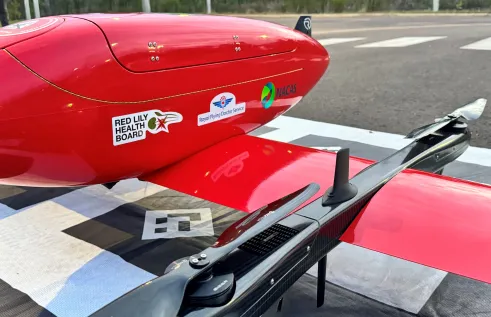
Medical deliveries and award nights: Historic milestones for NACAS
The North Australia Centre for Autonomous Systems (NACAS) has been recognised for their unique role in minimising the damage caused by ghost nets on the NT’s coastlines.
Read more about Medical deliveries and award nights: Historic milestones for NACAS
